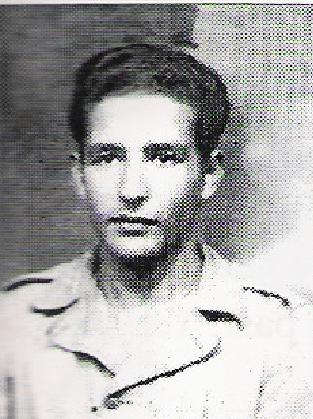 I was born in Chicago, Illinois, USA on 24th December 1928.
I was born in Chicago, Illinois, USA on 24th December 1928.
In 1944, having lied about my age, I enlisted in the Merchant Marine, staying in service until after the war (1948). During my attendance at a Zionist meeting in Chicago, I was introduced to two gentlemen who asked me questions relating to my time in the Merchant Marine. After telling them I had been to sea, they asked if I cared to join the “Jewish Navy” (Aliyah Bet, a clandestine movement that brought out people out of Europe to Palestine). I had heard stories and seen photos of the horrors our people had suffered. I felt that if by joining the Jewish Navy I could play a small part in bringing an end to their misery and persecution in Europe, I would join.
I made contact with the Mosad for Aliyah Bet and was on my way to Miami, Florida, in just a few weeks. From Miami we left the States on a ship built in the 1920s and bought from the US by the Mosad for Aliyah Bet. The ship was the “SS Paducah”, later renamed the “Geula”. It is difficult for me to both recall and set down faithfully a record of one shining moment. Perhaps now, after some 50 years, more dream than fact intrudes. That is unfortunate for we do not have that many shining moments to recreate and bring alive. It would see we ought to serve history better and I am sorry that I have let go of some dates, names, and places. I remember the old men and women, but best of all, I remember the children.
Even today, knowing that the “children” are now men and women with children and grandchildren of their own, in the playground of my mind they are children again. They always will be children for me. So briefly let me tell you the story of one day and part of an evening: Winter 1947; Burgas Bulgaria on the Black Sea. The “Paducah” will this day receive the Ma’apilim, the “illegals”, those who have survived the death camps of Katzet, Totenlager. The Russians, after playing cat and mouse, have decided to release the men, women, and children, having herded them into cattle cars along the pier railhead. The Jews may sail from Europe now. They must leave at once! Today. Or be returned to the camps they came from. The Jews may sail now from Europe to Eretz Yisrael.
During the morning and afternoon hours they came aboard, some sick, some walking straight and upright, some fearful imagining horrors to come as they recall previous queues. The old men and women, clutching a few personal belongings, incredulous that before them, assisting them, the crewmen of the “Paducah” speak to them in Yiddish, in Hebrew, in English, and sometimes, to obtain maximum and prompt response to orders, in German.
The men and women are amazed that they are in the hands of Jews who have come to take them from Europe. They cry, they talk, they have countless questions as they come up the gangway. They are happy, they are quiet, they are sad. Many cry as we speak of “going home”.
Once aboard, they are all led below deck where wooden shelves have been built for them to sleep. There would be no walking the decks of the “Paducah”. There would be no promenades, no constitutionals, the “illegals” would have to remain below deck for much of the voyage, hidden from RAF spotter planes operating from Gibraltar and hidden from the Royal Navy bloodhounds.
The children. They have been trained by the youth group leades under the direction of the emissaries from Eretz Yisrael. They are bright, confident, willing. They are what is left of the Jewish children of Europe. They, the children, assemble the men and women, herding them to their crude quarters below, placating the querulous and anxious, comforting the truly frightened and attending the sick in the hastily created sick bay. Late afternoon, the sun is setting on the Black Sea, the golden blue flecks coating the quiet black waters. We look to what we perceive as the East – Eretz Yisrael. We stand, huddled together, the crewmen and the children huddled together as if sharing a common need to touch, to bind, to unite. Watching the sun set, joined together by the moment, a shining moment, we join our ancestors, our histories, our past and our future becoming a people together, sharing a voyage, going home on the “Paducah” – “Geula”.
Quietly it started, not planned. The singing of Hatikvah – the song of hope and the persecutions, the murders, the inquisitions, the slaughter of a people became a part of us all, our shared history, our common past. Yet, we sang louder and louder of Hope. Quietly the song faded, reluctantly slipping away. Then the same clear voice began to sing a song I had never heard – Drei redele drei zich; Drei zich ahin und ahare; Drei redele drei zich; Und fir mich noch Eretz Yisroel. From the Yiddish: turn wheel turn, turn here and there. (Turn wheel turn, and take me to the Land of Israel).
Again, every voice, even from below deck, made the chilly night air warmer. And finally, the song that had to be sung, starting softly at first to the wind and then to all men…”Zug kein mal as dos is ‘die letzte veig’…Never say that this is the last way..Never say that we are going to meet our death again..Say instead “mir fuhren heim…”We are going home”.
This is what I remember. It is all I remember well enough to write about. It is all I’ll ever need to bring to life.
Source: Palyam website (www.palyam.org)

